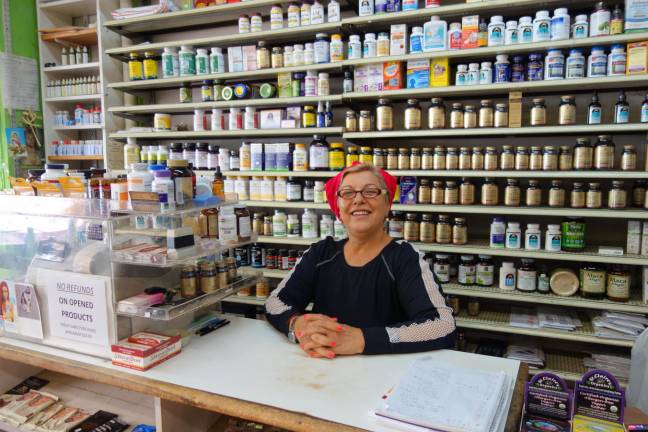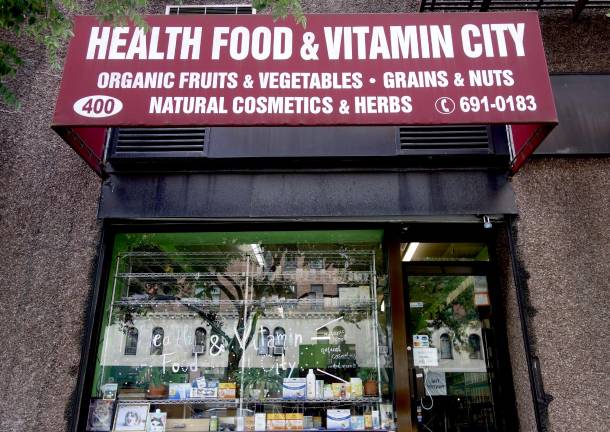Stores like Health Food & Vitamin City are becoming fewer and farther between. There is no website, no delivery. You can’t order from it using Amazon or Seamless. There isn’t a fancy neon sign out front, or any glamorous marketing displays inside. You’ll never see any advertisements, not even in our own Chelsea News. And yet, this neighborhood staple has been operating non-stop at 400 West 23rd Street, its original location, for more than thirty-three years.
It was founded in 1986 by Badal Roy, who has run the store ever since with the help of but one employee, Maria Niculsenku, who is from Romania. As she put it, she just “walked by the street and was shopping in store,” and after a few repeat visits as a customer began working with Badal, splitting the days between them. She's been working there for twenty-two years now, and adds a vivacious, garrulous energy to the store- quite a contrast to her boss, who is much more private (and thus her picture accompanies this story, instead of his).
The store is open seven days a week, almost without fail, which 61-year-old Roy attributes to the same lifestyle the health food store promotes.
Roy, of Indian origin, moved to New York so long ago he “can’t even remember when,” exactly, although he estimates it was just shy of forty years ago. He originally owned and managed three separate stores throughout New York City, one in the Bronx, one in Queens, and the surviving Chelsea store, across from London Terrace. Roy lives in Tudor City, but still, he loves this neighborhood. Asked about his favorite spots, he replied “Oh, I like Chelsea everywhere. Chelsea is the place to live.”
And the products from his store certainly encourage living, and doing so healthfully. He stocks such vitality-boosting staples as liquid aminos, spirulina and turmeric powders, goji and juniper berries, and all sorts of exotic sounding teas, tinctures, and essential oils. He carries some ready-to-eat options like vegetarian turkey salad, various yogurts and pre-made sandwiches in a refrigerated case as well, but with limited demand he keeps the perishable stock to a minimum. He is quick to offer individualized advice for whatever ails you, perhaps even inquiring your blood type or dietary habits to more specifically focus his recommendations.
Meg Siegel, a real estate agent for Sotheby’s, has a listing nearby, and happened upon the store by chance recently on her way to show the property. She browsed the aisles, and stockpiled a small arsenal of goods, some by way of Roy’s recommendation, purchasing some, and making a list of the rest for a return visit. As we all know, health food isn’t cheap, and she wanted to mete out her expenditures. She already had a hit-list of things she planned to purchase the next time she comes in.
That said, business is tough. Roy said it is probably down 75% from its heyday, what with Whole Foods nearby, bargain-priced Trader Joes and the whole small-business-killing Amazon monopoly. Still, whenever I visited he had customers, and enthusiastic ones at that. An elegant woman dressed in summer linen was buying some supplies for her husband, convalescing from a recent surgery. “This is a wonderful store,” she said. “It is precious.”
Given the increasing rarity of independently owned enterprises, this sort of regular customer is what keeps Roy going. “It’s perfect....my idea of perfect,” she gleamed proudly. The woman has lived in Chelsea for twenty-four years, and been coming to H.F.& V.C. for just as long.
Roy also welcomes a smattering of celebrities, some of whom have their picture on the wall by the entrance, like Ice-T and Jason Statham, or others who are more on the order of regulars, like “Law & Order’s” Sam Waterston.
But Roy isn’t a too enthralled by celebrity; he leads a simple life. His diet is simple and clean: he enjoys a mostly plant-based diet with lots of fresh produce, quinoa, and especially legumes, of which he sells multiple varieties in his store. An avid runner, however, clocking forty-plus miles a week, he abandoned sixteen years of vegetarianism to augment his diet with moderate amounts of animal protein for fuel, which he finds gives him the strength to continue his rigorous training.
Despite the salubrious array of comestibles, he stocks and consumes, the most healthful thing about Roy might be his perspective on business and life. He feels no need to be a millionaire; the modest productivity of the store is enough to sustain him, especially with a very cooperative (and perhaps singular) landlord who hasn’t raised his rent since he moved in. This alone might be the store’s most precious attribute.

